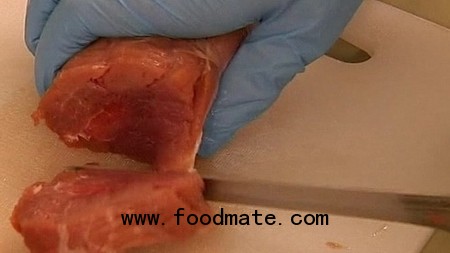
An investigator at the agency, Pontus Elvingson, told the BBC that tests were still being done to identify the dye.
The Swedish firm Heat AB imported the meat from a supplier in Hungary called Filetto. One of the suspect batches originated in Argentina.
Checks show that the dyed meat was first sold in Sweden a year ago.
It is not yet clear if Filetto also exported doctored pork to other countries. The Swedish agency has alerted EU authorities.
The BBC was unable to reach Filetto for comment.
Contamination threat
Mr Elvingson said the fake beef had been sold to several Swedish retail outlets, including restaurants. So far about 3.5 tonnes has been removed from sale.
"There is no indication that Heat AB sent any of the meat abroad," he told the BBC by phone. Heat AB was not registered as a food company, he added.
In Sweden, he said, "it's difficult to tell how much [doctored meat] there is and we don't know if it has all been sold".
"The pigmentation of beef is different - this meat is red, but seems not so well dyed in parts, so maybe it was injected with needles," he said.
If needles were used to inject the dye then bacteria could have been transferred from the meat's surface to the interior, increasing the risk of food poisoning, he added.
The agency was tipped off by Swedish wholesaler Svensk Cater, following a complaint from a customer.
Heat AB's Managing Director Ake Hultberg told Reuters news agency that the meat he had tried was good.
"When we received the product, I looked at it, I opened a box and took a sample which I myself fried and looked at it.
"And there was no problem with it but when it later came to Svensk Cater, there were fillets that were not beef but pork," he said, insisting that parts of the delivery were real beef.







